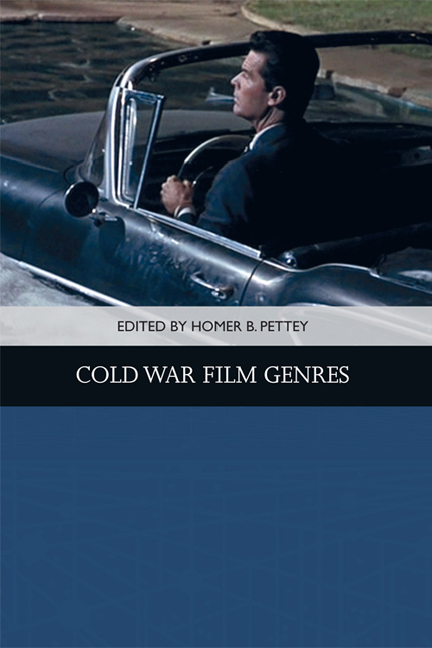Book contents
- Frontmatter
- Contents
- List of Illustrations
- Acknowledgments
- Notes on the Contributors
- 1 Introduction: Cold War Genres and the Rock-and-Roll Film
- 2 Social Factors in Brainwashing Films of the 1950s and 1960s
- 3 The Berlin Crisis? Piffl!: Billy Wilder’s Cold War Comedy, One, Two, Three
- 4 The Small Adult Film: A Prestige Form of Cold War Cinema
- 5 “I’m Lucky – I Had Rich Parents”: Disability and Class in the Postwar Biopic Genre
- 6 Rogue Nation, 1954: History, Class Consciousness, and the “Rogue Cop” Film
- 7 Internal Enmity: Hollywood’s Fragile Home Stories in the 1950s and 1960s
- 8 Suburban Sublime
- 9 Domestic Containment for Whom? Gendered and Racial Variations on Cold War Modernity in the Apartment Plot
- 10 Success and the Single Girl: Urban Romances of Working Women
- 11 Paris Loves Lovers and Americans Loved Paris: Gender, Class, and Modernity in the Postwar Hollywood Musical
- 12 Straight to Baby: Scoring Female Jazz Agency and New Masculinity in Henry Mancini’s Peter Gunn
- Index
10 - Success and the Single Girl: Urban Romances of Working Women
Published online by Cambridge University Press: 24 April 2021
- Frontmatter
- Contents
- List of Illustrations
- Acknowledgments
- Notes on the Contributors
- 1 Introduction: Cold War Genres and the Rock-and-Roll Film
- 2 Social Factors in Brainwashing Films of the 1950s and 1960s
- 3 The Berlin Crisis? Piffl!: Billy Wilder’s Cold War Comedy, One, Two, Three
- 4 The Small Adult Film: A Prestige Form of Cold War Cinema
- 5 “I’m Lucky – I Had Rich Parents”: Disability and Class in the Postwar Biopic Genre
- 6 Rogue Nation, 1954: History, Class Consciousness, and the “Rogue Cop” Film
- 7 Internal Enmity: Hollywood’s Fragile Home Stories in the 1950s and 1960s
- 8 Suburban Sublime
- 9 Domestic Containment for Whom? Gendered and Racial Variations on Cold War Modernity in the Apartment Plot
- 10 Success and the Single Girl: Urban Romances of Working Women
- 11 Paris Loves Lovers and Americans Loved Paris: Gender, Class, and Modernity in the Postwar Hollywood Musical
- 12 Straight to Baby: Scoring Female Jazz Agency and New Masculinity in Henry Mancini’s Peter Gunn
- Index
Summary
At the dawn of the twentieth century, Theodore Dreiser published Sister Carrie, a country-mouse Cinderella story that followed Carrie Meeber from rural Wisconsin to Chicago to make her fortune in the big city. Carrie's career involves trading up through a series of men until she finds independence as a New York actress, fully capitalizing on her skill at artifice that she uses to survive. Carrie's upward mobility is based on her ability to play a scene with whomever can help her and she ends the novel with neither regret nor self-awareness. Her career path is wholly determined by urbanism and the advantage she takes of the anonymity and opportunity afforded to country girls who can learn city ways quickly. Sister Carrie is at heart a reimagining of Moll Flanders, updated for a modern audience and stripped of its redemptive conclusion by the realities of American secularism. As such, the novel defines one plotline or trope of the career girl in the city.
By mid-century, U.S. women had served in auxiliary, support, and military capacities in two world wars, gained the right to vote, embraced coeducational college, and explored myriad jobs that had not been available to their mothers and grandmothers a half century before. During World War II, sociologists fretted about the reconfigured gender dynamic as women took wartime jobs, such as in this report from 1944: “It seems reasonably clear that the whitecollar jobs for women – teaching, secretarial work, and various kinds of merchandizing jobs – were enabled to attract and hold workers at low wages because of the social respectability attached to them. When the war made it equally respectable and somewhat more profitable to make airplanes, women deserted the old occupations in droves with the present embarrassing results for schools, offices, and stores. Whether the prestige of the old occupations will be restored with the coming of peace we cannot be certain.” Some of the earlier “white-collar jobs” of the interwar period absorbed postwar women workers but the skills and paychecks of wartime work led many young women to reject respectable but low-paid jobs. Girls sought careers and brought education and experience to the workplace. Cinema – both studio production and educational film – reflected this seachange in labor demographics.
- Type
- Chapter
- Information
- Cold War Film Genres , pp. 181 - 203Publisher: Edinburgh University PressPrint publication year: 2018



